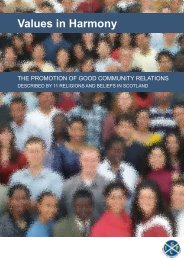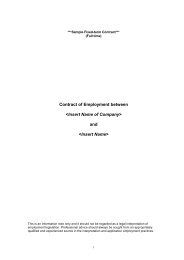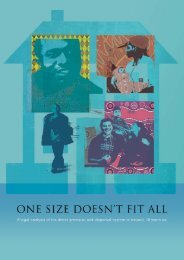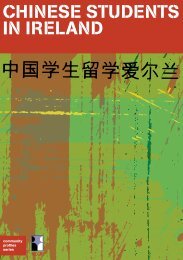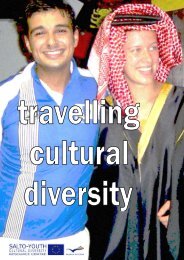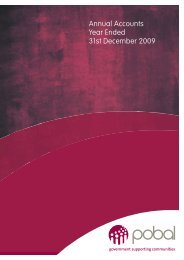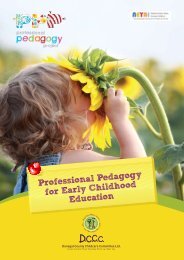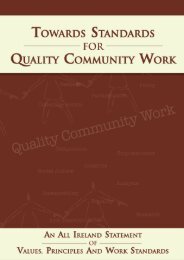Intercultural Education in the Post-Primary School - National Council ...
Intercultural Education in the Post-Primary School - National Council ...
Intercultural Education in the Post-Primary School - National Council ...
You also want an ePaper? Increase the reach of your titles
YUMPU automatically turns print PDFs into web optimized ePapers that Google loves.
DISCRIMINATION AND EQUALITYIn a literal sense, to discrim<strong>in</strong>ate simplymeans to recognise a difference or to makea judgement. People discrim<strong>in</strong>ate all <strong>the</strong>time <strong>in</strong> decid<strong>in</strong>g what food to eat, or whoto employ <strong>in</strong> a job. Where discrim<strong>in</strong>ationbecomes a problem is when <strong>the</strong> choice ordist<strong>in</strong>ction is made unfairly.In Ireland, it is aga<strong>in</strong>st <strong>the</strong> law todiscrim<strong>in</strong>ate aga<strong>in</strong>st a person <strong>in</strong> some areason <strong>the</strong> basis of• gender• marital status• family status (hav<strong>in</strong>g children or be<strong>in</strong>g acarer)• age (between <strong>the</strong> ages of 18 and 65)• disability• race• sexual orientation• religious belief• membership of <strong>the</strong> TravellerCommunity.(Equal Status Act, 2000)Two different types of discrim<strong>in</strong>ation arerecognised: direct discrim<strong>in</strong>ation and<strong>in</strong>direct discrim<strong>in</strong>ation. Both need to beunderstood if <strong>the</strong>y are to be addressed.Direct discrim<strong>in</strong>ation is <strong>the</strong> most obviousand easiest to see. If someone is treateddifferently because <strong>the</strong>y are a Traveller orbecause <strong>the</strong>y are black (refused access to apub, called names, treated with suspicionetc.) <strong>the</strong>n <strong>the</strong>y have been directlydiscrim<strong>in</strong>ated aga<strong>in</strong>st. In a 2001 survey ofethnic m<strong>in</strong>ority attitudes <strong>in</strong> Ireland, 78 percent of more than 600 respondents from avariety of ethnic m<strong>in</strong>orities liv<strong>in</strong>g all overIreland highlighted that <strong>the</strong>y had been avictim of such racism, most often <strong>in</strong> publicplaces like <strong>the</strong> street or <strong>in</strong> shops or pubs.Indirect discrim<strong>in</strong>ation means thatapply<strong>in</strong>g <strong>the</strong> same policies or opportunitiesto different people may appear fair, butmay not be fair if <strong>the</strong>y give rise to differentoutcomes. For example, if <strong>the</strong> same subjectis taught to both boys and girls, but all of<strong>the</strong> examples are chosen to <strong>in</strong>terest <strong>the</strong>boys only, this may discrim<strong>in</strong>ate <strong>in</strong>directlyaga<strong>in</strong>st <strong>the</strong> girl. If entry to a school isdecided <strong>in</strong> part on whe<strong>the</strong>r or not a childhas sibl<strong>in</strong>gs <strong>the</strong>re, this may <strong>in</strong>advertentlydiscrim<strong>in</strong>ate aga<strong>in</strong>st nomadic people.Likewise, if accommodation provision doesnot cater for people who move from placeto place, <strong>the</strong>n this may discrim<strong>in</strong>ate<strong>in</strong>directly aga<strong>in</strong>st Travellers. Treat<strong>in</strong>gpeople <strong>the</strong> same is not <strong>the</strong> same as treat<strong>in</strong>g<strong>the</strong>m equally.As with <strong>the</strong> concept of rights, youngpeople will beg<strong>in</strong> to develop anunderstand<strong>in</strong>g of fairness and unfairnessand will apply <strong>the</strong>se ideas to a range ofpractical situations (hav<strong>in</strong>g a say, tak<strong>in</strong>gpart <strong>in</strong> decisions, gett<strong>in</strong>g a fair share, etc.).As <strong>the</strong>y progress through post-primaryschool <strong>the</strong>y will develop a deeperunderstand<strong>in</strong>g of discrim<strong>in</strong>ation as <strong>the</strong>ylearn to recognise discrim<strong>in</strong>ation <strong>in</strong>everyday situations and as <strong>the</strong>y ga<strong>in</strong> anunderstand<strong>in</strong>g of <strong>in</strong>equalities <strong>in</strong> <strong>the</strong>ircommunity and <strong>in</strong> <strong>the</strong> wider world.Students can also be encouraged to takeaction <strong>in</strong> defence of those who suffer<strong>in</strong>equality and discrim<strong>in</strong>ation as <strong>the</strong>y ga<strong>in</strong>deeper knowledge and understand<strong>in</strong>g of<strong>the</strong> issues.58<strong>Intercultural</strong> <strong>Education</strong> <strong>in</strong> <strong>the</strong> <strong>Post</strong>-<strong>Primary</strong> <strong>School</strong>




